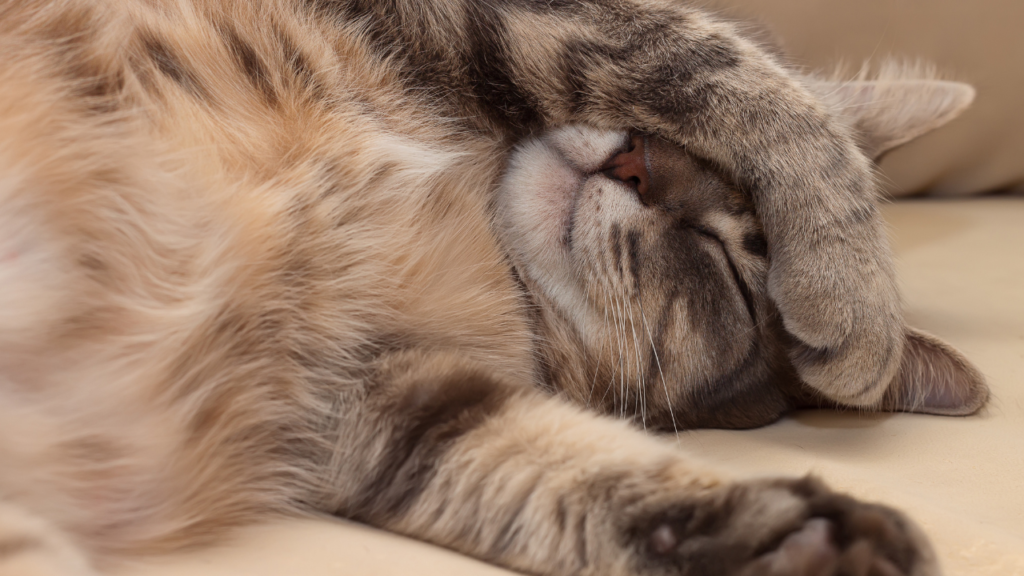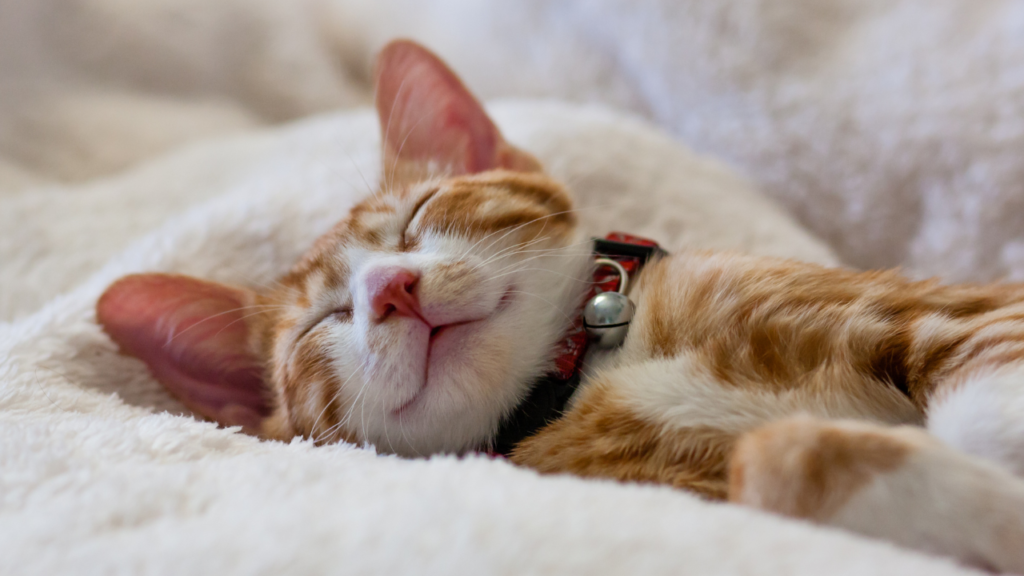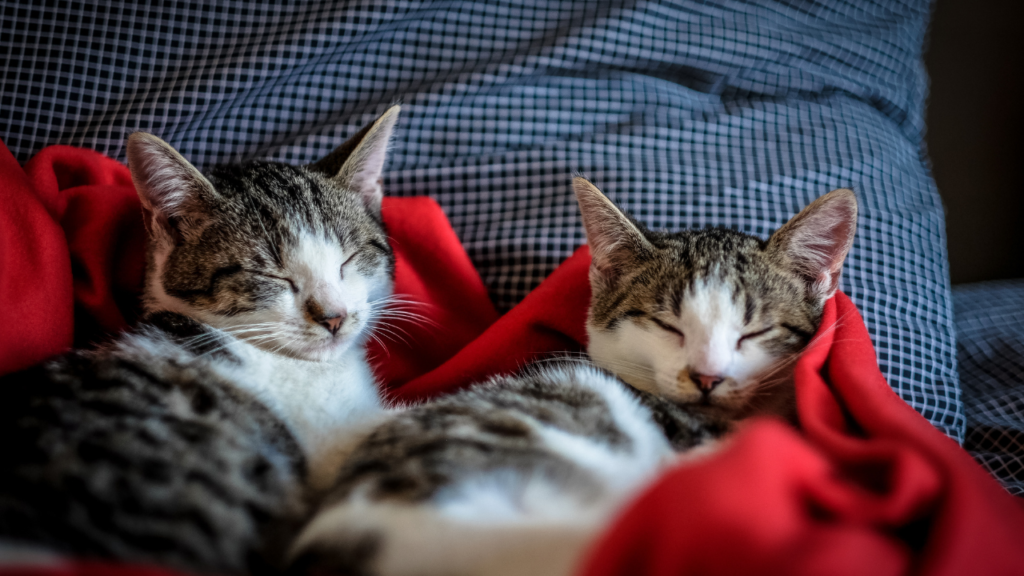
Your cat isn’t that lazy. Are you curious about why your cat sleeps so much?
You and your cat most likely share at least a few characteristics. Perhaps you both enjoy some peaceful time in front of the television, or maybe your feline companion adores cheese as much as you do. One thing you almost surely have in common is a preference for sleep. After all, who doesn’t enjoy snuggling up in bed on a cold winter morning? Even cats sleep more in the winter.
As nice as it is to snuggle up for a nap with your cat by your side, some cat owners question if their kitty is sleeping too much. When you’re unfamiliar with feline sleeping habits, it might be difficult to predict what to expect – but that’s where we can help. We’ll answer issues like how much cats sleep, why they sleep so much, and whether you should be concerned about their frequent naps.
How long do cats sleep?

Your cat appears to be sleeping a lot because, in fact, they are. Felines need nearly twice as much sleep per day as their owners, so don’t be surprised if you see your companion sleeping 13 to 16 hours each day. And that’s only for a healthy adult cat. Older cats, kittens, mama cats, and cats with health issues may require even more time to rest and recover. Purina reports that kittens can sleep for up to 20 hours every day!
Remember that cats do not obtain all of their sleep in one sitting. They truly do take “cat naps,” which can last anywhere from 15 to 30 minutes. They may wake up momentarily and then fall back asleep for cat nap number two, or they may be more active in between naps. This is an innate behaviour that permits felines to rest without falling in a deep sleep, which could expose them to a variety of threats.
Why does a cat sleep so much?

Cats naturally nap a lot, but it’s not always clear why cats require so much sleep or when their sleeping habits should change. Fortunately, a little education can go a long way. These are the common variables that influence a feline’s sleeping patterns, including why your cat sleeps so much.
Catnaps save a lot of energy.
When your cat takes multiple short cat naps throughout the day, it may appear that he or she is sleeping all day. The truth is that they spend much of that time resting rather than sleeping. They may even remain in the same location between cat naps due to causes like as limited mobility, lethargy, or energy conservation.
This is especially useful as cats are natural predators. Hunting, feeding, and even playing all need a lot of energy, which they must replace by resting. Similarly, your cat may preserve energy during the day (by sleeping more) in order to be more active at night. This is normal for crepuscular creatures such as cats, who are most active at dawn and dusk, and there is no need to be concerned.
Your cat may sleep more when it is stressed, depressed, or bored.
Although getting plenty of sleep is usually a positive thing, it can also be an indication of something wrong. A cat may sleep more after being under a lot of stress because worrying is taxing. Many people may relate to a shift in sleeping habits when worried or depressed, but it can be more difficult to tell when a cat is going through a difficult time.
If you detect an unusual shift in your cat’s sleeping habits, you might want to research feline boredom and stress. If they don’t return to normal in a few days, a trip to the vet isn’t out of the question.
When to be concerned about a cat sleeping excessively.
Most of the time, you shouldn’t be concerned about a cat that appears to sleep a lot. The exception is if you observe a significant or sudden shift. The increased nap frequency that comes with age, for example, will occur gradually, but a cat napping for 14 hours one day and 20 hours the next may require closer monitoring. This is more likely to indicate that your cat is ill, injured, or badly affected by stress or melancholy.
If you detect any other unexpected changes in your pet’s behaviour or appearance, do not hesitate to call your veterinarian. Please call them if:
- Your cat has had unexplained weight reduction.
- Your cat refuses to eat and drink.
- Your cat is overeating.
- Your cat exhibits severe or unexplained vomiting or diarrhoea.
- Your cat is agitated or exhibiting signs of suffering.
Even if your cat is merely suffering from a regular cold, it is always preferable to be safe than sorry when it comes to your closest furry companion. It’s always a good idea to keep an eye on your cat if any of their routines or behaviours alter, but there’s no need to panic. Cats usually don’t sleep much.
How exactly does cat sleep work?
When your cat sleeps, they alternate between a light doze and a deep sleep.
Light sleep lasts anywhere from fifteen minutes to half an hour, but deeper sleep lasts only around five minutes at a time. When cats are in light sleep, they can wake up quickly: their ears will remain upright, responding to sounds in their environment; they may move their tail; and one eye may be partly open.
During deep slumber, your cat’s posture, especially its ears, will be significantly more relaxed. You may notice them twitching or paddling the air with their paws.
How long does a kitten sleep?
Kittens sleep more than the normal cat, and they spend almost 90% of their time sleeping! This is due to the fact that their brain and central nervous system are still developing, thus they require regular battery replenishment. Furthermore, the time kittens spend sleeping builds their muscles and bones while also keeping their immune system functional.
How long does a senior cat sleep?
Not only do kittens sleep a lot, but older cats do as well, often napping up to 20 hours each day. Cats, like people, tyre more quickly as they age, therefore they require more sleep. However, if this change occurred rapidly, it is preferable to consult your veterinarian.
